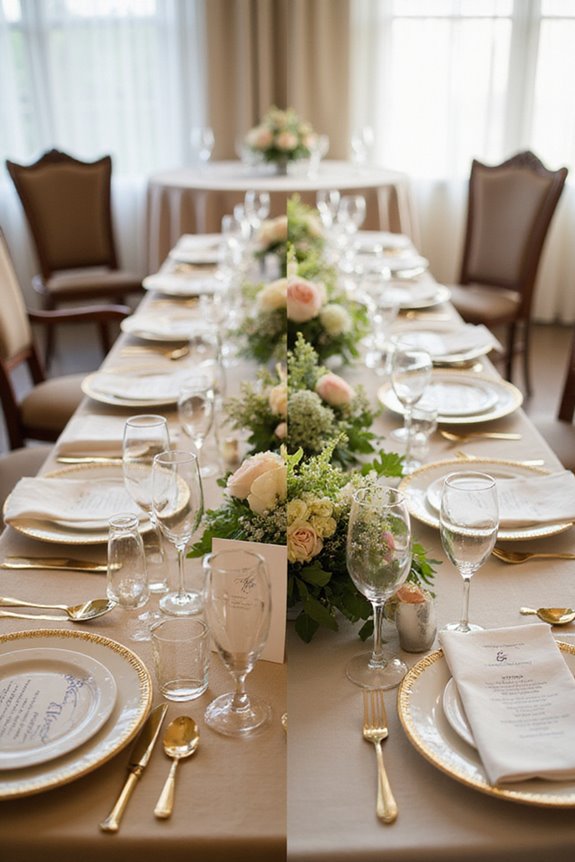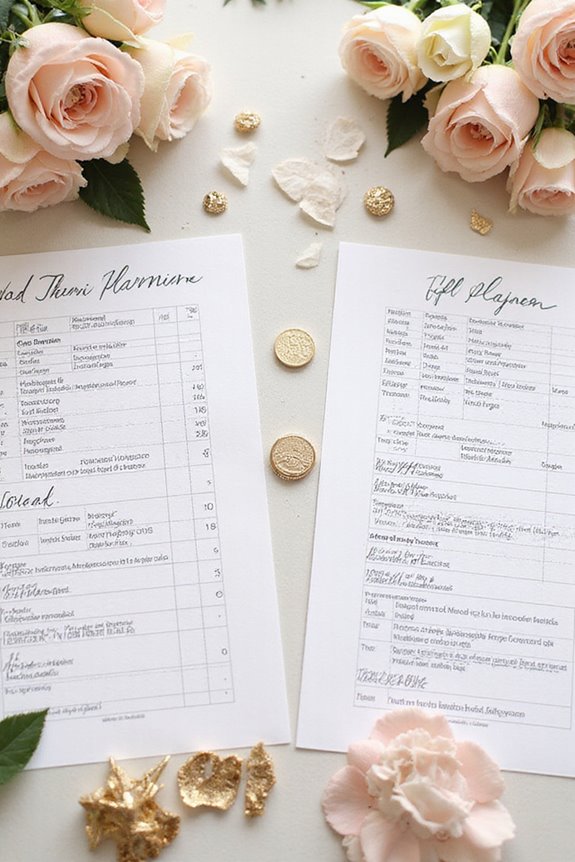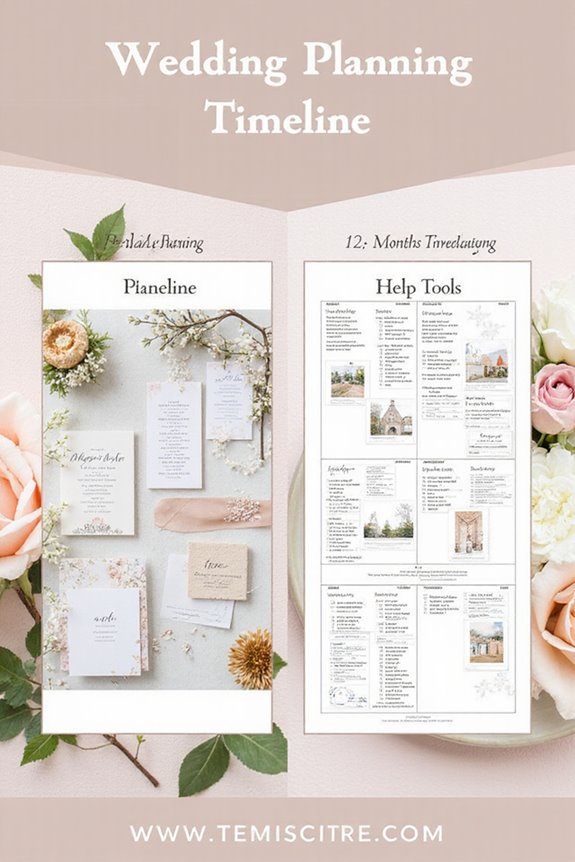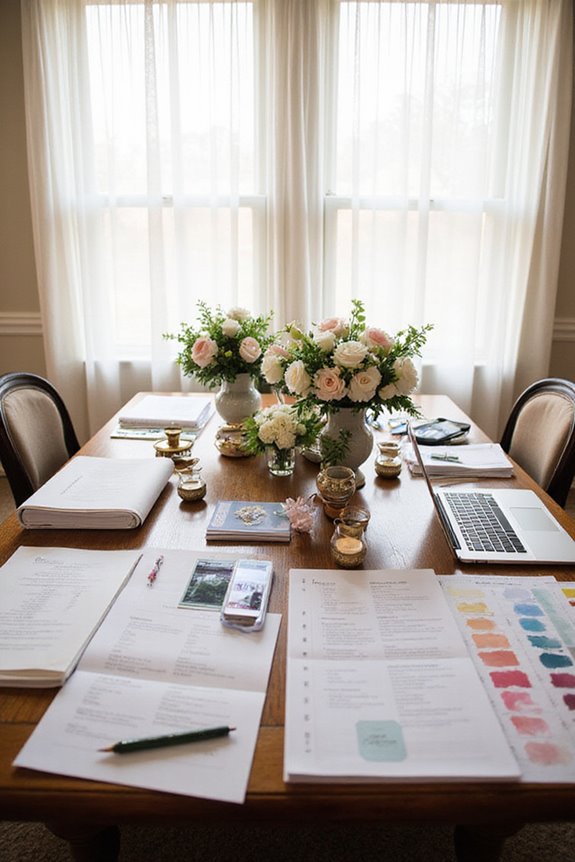When it comes to wedding planning, understanding full and partial planning is key. Full planning means we handle everything from start to finish, perfect for those wanting to relax and enjoy the process. It ranges from $6,000 to $20,000. On the other hand, partial planning kicks in after some groundwork is done—it’s more budget-friendly, between $1,500 to $10,000, and allows for more control. Think of it as a team effort! We’ll share more specifics to help you decide.
Key Takeaways
- Full planning offers comprehensive support from concept to wedding day, while partial planning begins after initial steps are completed.
- Full planners manage all aspects, including vendor selection and contract negotiation, whereas partial planners assist with finalizing details.
- Full planning typically costs between $6,000 and $20,000, while partial planning ranges from $1,500 to $10,000, offering more pricing flexibility.
- Clients experience less stress with full planning, allowing for minimal involvement, while partial planning encourages greater client engagement and decision-making.
- Full planning provides extensive service delivery from engagement onward, whereas partial planning allows for timeline flexibility after major decisions are made.
Definition and Scope of Full and Partial Planning
When it comes to planning a wedding, understanding the difference between full and partial planning can feel overwhelming, especially with so many details to take into account. Full planning is like having a personal wedding coach, guiding us from the initial concept to the big day. It covers everything, from vendor selection to on-site management—perfect for those who want a hands-off approach.
On the other hand, partial planning is more budget-friendly. It starts after some initial planning steps, helping us finalize details and vendors as the event date approaches. Think of it as a helping hand when we need it most. Both approaches offer unique support, making our wedding dreams come true, just in different ways!
Client Involvement and Control in Event Planning

Understanding how much control we want in our wedding planning is key to creating an event that truly reflects our vision. With full planning, we can relax and let the planners handle most decisions, leaving us with minimal involvement and stress. However, if we choose partial planning, we gain more decision authority, engaging actively in the process. For example, we might select the venue or major vendors while leaning on planners for support. This approach can be rewarding, allowing us to shape our event while still getting expert advice. It’s all about finding the right balance of client engagement that matches our comfort level. Ultimately, whether we prefer hands-off or hands-on, communication is essential for a smooth planning experience!
Cost Differences Between Full and Partial Planning

Steering through the cost differences between full and partial wedding planning can feel like a maze, but it doesn’t have to be overwhelming. Here’s the scoop: full planning usually sets you back between $6,000 and $20,000, while partial planning can cost anywhere from $1,500 to $10,000. If you’re working with a budget, partial planning offers pricing flexibility, often with flat fees or negotiable rates. This can lead to better cost transparency, so you know exactly what you’re paying for. Keep in mind that extra services can add up, regardless of the planning type. So, consider what aspects you truly need help with and choose accordingly. Let’s keep those costs in check while crafting your dream day!
Timing and Service Delivery for Each Planning Type

Steering the timing and service delivery of wedding planning can feel like piecing together a puzzle, especially when deciding between full and partial planning.
Timeline Flexibility
With partial planning, we kick things off after you’ve made those big decisions. This allows for timeline flexibility as we help finalize contracts and coordinate vendors in the final stretch. It’s perfect if you still want to be involved!
Service Delivery
On the flip side, full planning offers extensive service delivery from the engagement onward. We handle everything, ensuring no detail slips through the cracks. If you want less stress and more time to enjoy the process, full planning might be your best bet.
Ultimately, it’s about what makes you feel comfortable and supported during this exciting time!
Roles and Responsibilities of Full and Partial Planners

When it comes to wedding planning, knowing the roles and responsibilities of full and partial planners can really help us decide which option fits our needs best. Full planners oversee everything, acting as our main advocate and managing vendor selection from start to finish. They negotiate contracts and maintain timelines, ensuring our vision is realized smoothly.
On the other hand, partial planners step in closer to the big day, helping finalize vendor contracts and coordinating details we may have missed. They’re great for those who’ve done some groundwork but need a little extra support. Think of them as our wedding day superheroes, swooping in for the final countdown! Knowing these differences makes it easier to choose the right planner for us.
Benefits of Full Planning for Clients
Choosing full planning for our wedding can be a game changer, especially if we want to enjoy the journey without the stress. Full planning gives us ultimate stress relief by letting professionals manage all the details. They handle vendor logistics, ensuring everything runs smoothly on our big day. Plus, we save time since planners take care of research and appointments.
When it comes to budget management, full planners help us avoid unnecessary expenses and negotiate better deals. They guide us on what’s feasible within our budget, so we don’t end up with hidden costs. With their expertise, we can focus on what really matters—celebrating our love without the overwhelming chaos. After all, this day should be about joy, not stress!
Ideal Client Profiles for Partial Planning Services
Finding the right fit for partial planning services can feel like searching for a needle in a haystack, but it’s totally doable! Ideal clients for these services often have moderate to high wedding budgets yet want to maintain personal touches. They’re usually busy professionals, juggling work and life, who still want some control over their wedding planning.
They value collaboration, especially when it comes to vendor selection and timelines. For instance, if you’re unsure about reliable vendors but want to stick to your couple preferences, partial planning can help. We can recommend trusted vendors while you handle the fun stuff, like picking décor! By targeting specific pain points, we create a customized experience that fits your vision and budget perfectly.
Frequently Asked Questions
Can I Switch From Partial to Full Planning Later On?
We can switch from partial to full planning later on, but it’s important to discuss this with our planner early. Planning flexibility is key to ensuring a smooth changeover and thorough support throughout the process.
How Do I Choose Between Full and Partial Planning?
When we’re deciding between full and partial planning, we should consider our budget considerations and timeline management. Balancing our needs with costs can help us find the perfect fit for our wedding vision.
Are There Hybrid Options Between Full and Partial Planning?
Absolutely, there are hybrid planning options for flexibility! We can customize packages that blend aspects of partial and full planning, ensuring we get the support we need while keeping our involvement in the process.
What Happens if My Planner Is Unavailable on the Event Day?
Imagine a safety net beneath a tightrope walker; that’s our planner backup. If our planner’s unavailable, we’ve got an event contingency in place, ensuring everything flows smoothly, like a well-rehearsed dance, no matter what.
Can I Handle Certain Aspects While Using a Planner?
Yes, we can definitely handle certain aspects while using a planner. By coordinating tasks and delegating responsibilities, we can guarantee our vision shines through while still benefiting from professional guidance throughout the planning process.





